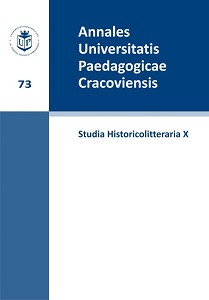Funkcjonowanie stereotypu Cygana w świadomości społeczności wiejskiej – Chata za wsią Józefa Ignacego Kraszewskiego
The stereotype of a Gypsy in the consciousness of a peasant community – Chata za wsią by Józef Ignacy Kraszewski
Author(s): Anna SikoraSubject(s): Studies of Literature, Polish Literature, Cultural Anthropology / Ethnology, Ethnic Minorities Studies
Published by: Wydawnictwo Uniwersytetu Komisji Edukacji Narodowej w Krakowie
Keywords: Gypsy; stereotype; peasant community; consciousness; Józef Ignacy Kraszewski;
Summary/Abstract: The article presents the problem of the Gypsy stereotype in village society on the example of the novel Chata za wsią by Józef Ignacy Kraszewski. It is the first novel describing this matter in Polish literature in the 19th century, and the only publication about Gypsies in Polish literature. The state of research on Gypsies in that time was limited to the few works by Tadeusz Czacki, Ignacy Daniłowicz and Teodor Narbut. Those publications were not free from stereotypes and pejorative opinions about Gypsies, showing them as idlers, frauds and thieves. Kraszewski, when writing Chata za wsią, used the available scientific works about Gypsies, but also his own observations about the life of this ethnic group. The novel contains two complementary plots. One of them shows the history of the nomadic Gypsy group coming to Stawisko, and the other shows different features of the village inhabitants. There is an ethnic conflict between those two groups, which shows the negative attitude of peasants to Gypsies. The main source of the peasants’ distance to the Gypsy group in Stawisko is the fact that they are regarded as physically, psychically, socially and culturally different. This ‘difference’ becomes the basic criterion of the stereotypical evaluation and causes dislike and hostility towards them. The obvious sign of the physical difference of Gypsies are dark hair and dark complexion. Those features are exposed in the description of every character of this nation. They emphasize their exotic nature and make it easier to feel distance towards them. In the very beginning of the novel, the peasants, who watch the newcomers carefully, let them feel that they are not welcome there because they are strangers. The cultural difference of Gypsies is easily noticed in the language they use, their original clothes, and their specific lifestyle: free and independent. There is also a strong belief in Gypsies’ consciousness that Mrodenoro (God) sentenced them to damnation whenever they join with a different race. That is why they respect God’s order in a special way, and they destroy and kill their enemies. A Gypsy, Aza, follows those rules in the novel. Social differences between the Gypsies and the peasants are exposed the most when Motruna Lepiuk’s daughter wants to marry the Gypsy called Tumry. Lepiuk, who is a half-Gypsy and a half-peasant, is fully aware of the differences between those two races. Being a peasant gives him real roots and a strictly set position in the village hierarchy. Gypsies are nomadic, pagan people, who do not create any stable forms of organization and who do not have any property. Lepiuk does not want his “peasant daughter” to marry the “brave Gypsy.” Another reason of his strong objection to this marriage are the psychical and mental differences between the peasants and the Gypsies, who are not used to leading stabilized life and do not feel the need of roots and bonds. Lepiuk says that Tumry would miss his nomadic life and leave his wife. There is no possibility to change his nature and habits. This conflict extends over the whole village society. Even though Tumry is a great smith, he and his wife are totally excluded from the society. For the inhabitants of Stawisko he is just a stranger, and Motruna is a daughter who did not respect her father’s order. Chata za wsią shows the autonomy of Gypsies and their stereotypical perception, full of bias and hostility. The author employed all the general opinions about Gypsies that he encountered in the literary works that he used while writing his novel. Although he was not fully objective, it must be emphasized that Gypsies in his novel are kind, and the author expresses his sympathy and compassion towards them.
Journal: Annales Universitatis Paedagogicae Cracoviensis. Studia Historicolitteraria
- Issue Year: 2010
- Issue No: 10
- Page Range: 36-51
- Page Count: 16
- Language: Polish

